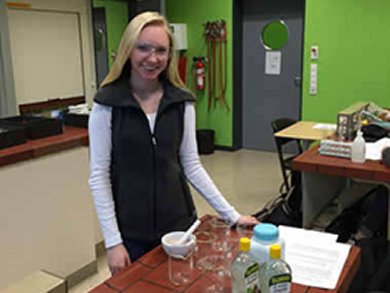Approximately 50 students from the Southeast U.S. receive a scholarship from The Congress-Bundestag Youth Exchange to study in Germany as a student ambassador for one year.
Adrian Henschel, a student at a German school, interviewed the exchange student Abigail Avery from the United States for ChemistryViews.org. Abigail is currently spending her gap year studying at a German gymnasium. Her two advanced courses are English and chemistry.
Abigail, what are the main differences between how chemistry is taught in the US and German school systems?
To begin with, on average, students in the U.S. only take one year of chemistry during high school. So coming into the advanced chemistry class here at the gymnasium was a little intimidating, seeing as most students had multiple years of chemistry, typically beginning in the 7th grade. There is also much more analysis and independent work centered more on problem solving. Here I have also experienced that we are able to work on an experiment in the lab at least once a week, whereas at home in the U.S., lab work does not happen as often.
So, given that you experienced so many differences, was it difficult for you to adapt to the German chemistry class?
In the beginning, the language barrier was the most difficult to adapt to. I only had a few years of German prior to my arrival in Germany. The German vocabulary I did learn was very basic and did not prepare me for any scientific classes. After six months in Germany, however, I can say that I have definitely improved and am able to understand more every day. My German is still not perfect, but I can easily follow along in class now.
It sounds like you enjoy your chemistry class here at the Marianne-Weber-Gymnasium. What are your favorite aspects of the lessons?
I really enjoy the small class size here, as we only have 12 students. The relationship between teacher and student is a lot more personal, and there is a much more friendly atmosphere in class, as opposed to larger classes, where the atmosphere is much more hectic.
Still, the caliber of material covered is at a high level that prepares all the students for university. I have also found everyone in the class to be hard working and dedicated, which is an inspiring atmosphere to work in. To keep the lessons interesting and fun, we also often discuss and include experiments that deal with real-life situations and circumstances. For example, we calculated the amount of calcium carbonate in an eggshell and constructed a battery using lemons, where the reaction of magnesium and copper in combination with the citric acid could be seen. Our teacher is very supportive and is even willing to try some things in English. I am also very grateful for all of the opportunities this class has offered me so far.
What opportunities are you referring to?
I had the opportunity to go on a field trip to Leverkusen, where the Chem-Park and headquarters of the Bayer Company are located. We were able to work in one of their laboratories and tour the complex, which was a wonderful experience. My teacher has also taken my interest in medicine into account by giving me the opportunity to parallel the work we are doing in class with organic chemistry, which is an important subject if I would like to pursue studying medicine in the future. He has given me multiple resources for my independent study of organic chemistry outside of class.
Thank you very much for the interesting discussion, Abigail. Have fun in your remaining time here in Germany.




